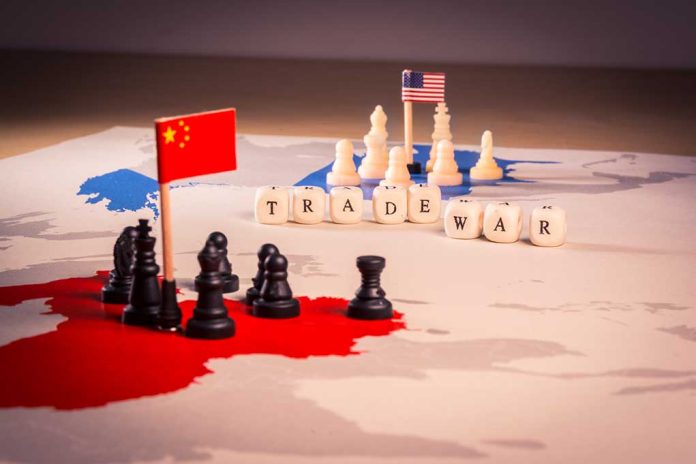
President Trump secures a landmark trade deal with China, definitively proving his critics wrong and delivering a significant win for American workers just months after returning to office.
Key Takeaways
- President Trump’s administration announced a new trade deal with China, addressing a massive $1.2 trillion trade deficit
- The negotiations were concluded quickly in Switzerland, demonstrating Trump’s superior deal-making ability compared to previous administrations
- Trump’s strategic use of tariffs as leverage has been vindicated despite initial criticism from economic experts
- Treasury Secretary Scott Bessent and Trade Representative Jamieson Greer confirmed substantial progress with details forthcoming
- This agreement follows a successful UK trade deal, showcasing the administration’s commitment to the America First policy
America’s Negotiation Strategy Proves Effective
The Trump administration has successfully negotiated a trade agreement with China that addresses America’s staggering $1.2 trillion trade deficit. This breakthrough comes after President Trump declared a national emergency over trade imbalances and strategically implemented tariffs to bring Chinese officials to the negotiating table. The swift resolution demonstrates President Trump’s exceptional dealmaking abilities, as negotiations in Switzerland yielded positive results within days rather than the months or years typical of previous administrations’ diplomatic efforts.
Treasury Secretary Scott Bessent expressed optimism about the agreement, confirming that substantial progress has been made in addressing trade concerns between the world’s two largest economies. “We’ve made significant strides in our discussions with China. The details of this comprehensive agreement will be released soon,” said Bessent. The Chinese delegation has reportedly shown unusual willingness to accommodate American concerns, recognizing President Trump’s resolve in protecting American economic interests.
US-China Trade Talks: Seeking Common Ground Amid Tensions
In Geneva, Switzerland, high-level trade discussions between the US and China are underway, marking a potential thaw in the ongoing economic dispute that began under former President Donald Trump. Led by Chinese Vice… pic.twitter.com/ydPc0LO0N9
— Political Maverick (@PoliticalMav) May 10, 2025
Tariff Strategy Vindicated
President Trump’s controversial decision to use tariffs as leverage has been thoroughly vindicated by this successful agreement. When initially implemented, economic experts and political opponents predicted economic disaster, with warnings of increased consumer prices and market disruption. Instead, the tariffs successfully created the pressure needed to bring China to serious negotiations, accomplishing in months what previous administrations failed to achieve in years of diplomatic talks.
U.S. Trade Representative Jamieson Greer highlighted the efficiency of the negotiation process, attributing the quick agreement to effective preparation and President Trump’s clear objectives. “This shows what can be accomplished when you have a president who understands business and isn’t afraid to use America’s economic power to secure fair deals,” said Greer during a press briefing following the talks in Geneva. The administration’s approach creates a new paradigm for international trade negotiations.
🇺🇸🇨🇳🤝 Trump Eyes Fair Trade Deal With China, Hints at Possible Announcements
🔹 Summary:
President Donald Trump said the U.S. is engaging with multiple countries, including China, to pursue new trade deals, with fairness as his key priority.
While no talks with Xi Jinping are… https://t.co/51ppU4mR3G pic.twitter.com/UMCK8Po7pz
— PiQ (@PiQSuite) May 5, 2025
Economic Benefits for American Workers
The newly announced agreement is expected to generate significant economic benefits for American workers and businesses. President Trump has consistently emphasized his commitment to bringing manufacturing jobs back to the United States and reducing the trade deficit with China. This agreement represents a tangible fulfillment of campaign promises made to American workers in manufacturing states who have suffered from unfair trade practices and outsourcing over the previous decades.
This deal follows the recently concluded trade agreement with the United Kingdom, demonstrating a pattern of diplomatic and economic victories for the Trump administration’s America First policy. Economic analysts who initially criticized the president’s approach are now acknowledging the effectiveness of using America’s enormous market as leverage in negotiations. The administration has succeeded where others failed by refusing to accept unfavorable terms and maintaining a strong negotiating position throughout discussions.




